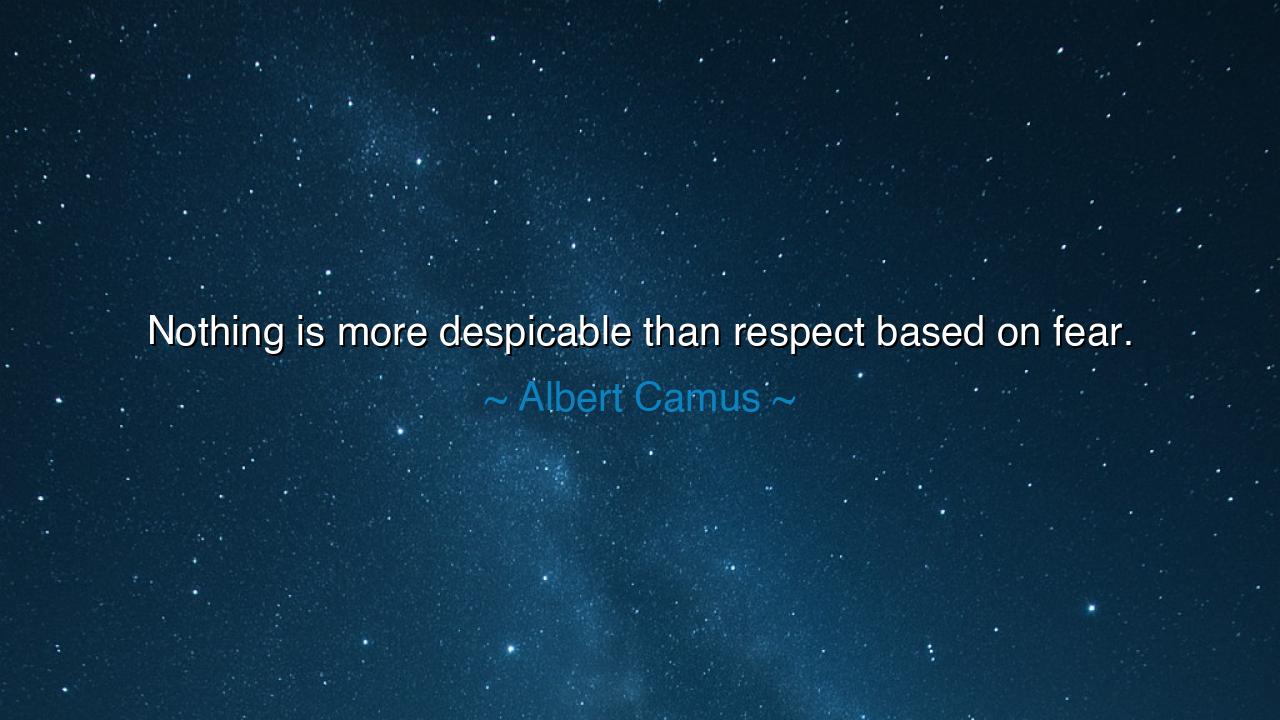
Nothing is more despicable than respect based on fear.






Host: The corridors of the old courthouse were hushed, hollow, and cold. The lights above flickered, casting long shadows that stretched across the marble floor like the ghosts of past judgments. The air smelled faintly of dust, paper, and regret.
Host: In Courtroom Nine, a storm was brewing—not of weather, but of will. The rain outside tapped against the tall windows, steady, rhythmic, like a heartbeat on the edge of collapse. Jack sat at the defense table, his coat draped over his shoulders, his eyes fixed on nothing, yet burning with something unspoken. Across from him, Jeeny stood, her arms folded, her posture steel wrapped in grace.
Host: Between them, on the wooden bench, lay a file—thin, but heavy with truth. The words of Albert Camus echoed in the silence, like a verdict no one had yet read:
“Nothing is more despicable than respect based on fear.”
Jack: “You believe that, don’t you?” he said, his voice low, measured, like a confession disguised as a question. “That respect born of fear isn’t real—that it’s just obedience in a mask.”
Jeeny: “It’s not just belief, Jack. It’s truth. When people fear you, they’ll follow you—but they’ll never trust you. And when the fear fades, so does their loyalty.”
Host: The sound of thunder rolled outside, deep, slow, inevitable. Jack leaned back, his hands interlaced, his gaze dark.
Jack: “You talk like you’ve never needed to be feared. Sometimes fear is the only language people understand. Power, order, respect—they all come from it. You think the world runs on virtue? It runs on leverage.”
Jeeny: “That’s not power, Jack. That’s domination—a temporary illusion. You can build an empire out of fear, but it’ll crumble the moment people remember they’re free.”
Host: She moved toward the window, her reflection merging with the lightning outside. Her voice was quiet, but every word struck like a gavel.
Jeeny: “Do you know what respect really is? It’s when people listen to you even when you have no power left. Fear demands submission; respect inspires presence.”
Jack: “That’s idealism,” he snapped, his tone sharper than he intended. “In the real world, people don’t follow what’s right—they follow what they’re afraid to lose.”
Jeeny: “And yet, that’s why we’re here, isn’t it? To change that real world. Camus wasn’t just talking about politics, Jack. He was talking about the soul. About how fear corrupts everything it touches—even love.”
Host: The rain beat harder now, sliding down the windowpane like tears. Jack’s fingers drummed against the table, his voice low, almost introspective.
Jack: “You think I don’t know that? You think I don’t remember what it’s like to earn someone’s respect the wrong way? My father—he was a man people feared. He demanded obedience, and for years, I called that honor. But when he died, the room was empty. Not one soul came to mourn—only to breathe easier.”
Jeeny: “Then you already understand. Fear doesn’t bind people—it divides them. It teaches them to hide, to lie, to pretend. It kills the truth before it even learns to speak.”
Host: Jack’s eyes lifted, the weight of her words pressing against him like a truth he’d buried for too long.
Jack: “So what do you do, then? You just hope people will respect you out of love? That they’ll choose what’s right without being afraid of the consequences?”
Jeeny: “You teach them, Jack. Not by force, but by example. You lead with integrity, not intimidation. It’s slower, yes. It’s harder. But it lasts.”
Host: The clock on the wall ticked, its rhythm like the heartbeat of the room—steady, relentless, true. The rain eased, the lightning moved further away, but the storm between them still lingered.
Jack: “You think that’s what Camus meant? That fear-based respect is despicable because it dehumanizes both the giver and the receiver?”
Jeeny: “Exactly. Because fear doesn’t recognize a person—only a threat. And when you’re just a threat, no one sees your humanity. They only see your shadow.”
Host: Her words hung there, delicate yet devastating. Jack rose, walked to the window, and looked out at the street below—people passing, umbrellas blooming, lights flickering in the rain.
Jack: “You know… when I was a kid, I thought fear kept me safe. It made people listen. But now I see it just isolates you. You can’t build bridges when your hands are clenched.”
Jeeny: “That’s what wisdom looks like, Jack—when you realize that the power you wielded was just a cage you built for yourself.”
Host: The silence that followed was thick, alive, heavy with understanding. The rain had stopped. The light from the lampposts streamed through the window, soft, gold, forgiving.
Jack: “You think the world can ever learn that? That respect without fear is possible?”
Jeeny: “It has to. Because if it doesn’t, then we’ll keep mistaking control for leadership, and silence for peace.”
Host: Jack turned, studying her, the woman who had challenged every truth he’d built his life on. A faint smile tugged at his lips, not of victory, but of recognition.
Jack: “Maybe Camus was right. The most despicable thing isn’t fear itself—it’s when we dress it up as respect and call it virtue.”
Jeeny: “Yes. Because true respect doesn’t bow. It stands.”
Host: And in that moment, the storm finally broke—not outside, but inside them both. Walls built from ego, authority, and pride began to crack, letting in a new light, pale and pure, the kind that reveals rather than blinds.
Host: The camera pulled back, the room now bathed in the calm after the tempest—two souls changed, not by victory, but by understanding.
Host: And as the credits of silence rolled over the scene, the voice of Camus lingered like the final note of a sermon that had been waiting to be heard:
Respect built from fear is not strength. It is the slow death of love.






AAdministratorAdministrator
Welcome, honored guests. Please leave a comment, we will respond soon